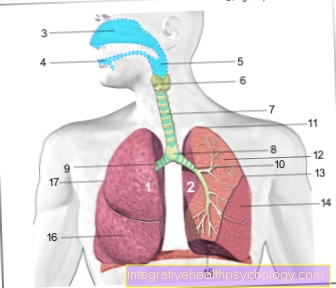Can you cure arteriosclerosis?
Can you cure arteriosclerosis?
Atherosclerosis, or hardening of the arteries, as the popular saying goes, is a very common chronic disease. It causes circulatory disorders throughout the body and is often ultimately the cause of a heart attack or stroke.
It is therefore only understandable to deal with the question of whether arteriosclerosis can be cured. In medicine, curing a disease means that the initial state of health has been restored.
There must be no residual damage. Therefore, the question of whether arteriosclerosis can be cured can be answered with a clear no.

Stopping atherosclerosis
According to the current state of science, it is not possible to cure arteriosclerosis.
So you cannot reverse the damage that the disease has caused to the vascular walls. The calcifications (plaques) remain. Even if the disease cannot be cured, doctors have a whole arsenal of weapons at their disposal in the fight against the disease.
The most important basis of a good arteriosclerosis treatment is the therapy of the corresponding risk factors.
Numerous factors are now known that promote the development of arteriosclerosis.
Even if you cannot reverse existing damage to the vascular system by treating the causes, the disease can still prevent further progression.
First of all, non-drug measures in terms of lifestyle change are most important. Patients are advised to change their diet, incorporate more exercise into everyday life, quit smoking and lose weight.
In detail, this means
- that a wholesome Mediterranean diet with lots of vegetables, fish and olive oil is recommended.
- Adequate exercise lowers the risk of high blood pressure, diabetes mellitus, obesity and thus also hardening of the arteries.
- It would be advisable to abstain from nicotine completely.
- A structured smoking cessation treatment can be useful. At the very least, the patient should significantly reduce their cigarette consumption.
- The last point in the non-drug measures is certainly weight normalization. Overweight and obesity favor the development of arteriosclerosis.
Do you want to actively do something about your arteriosclerosis yourself? Read more about
- The diet in atherosclerosis
These measures are actually recommended for all people, as they can prevent the occurrence of arteriosclerosis as far as possible.
Find out more about the topic here: Risk factors of arteriosclerosis
Treatment of the risk factors
However, if diseases such as high blood pressure, diabetes or lipid metabolism disorders already exist, these must of course be treated with medication.
Treatment of arteriosclerosis always means treatment of its risk factors.
First of all, it is important to control your blood pressure well. The aim of blood pressure therapy should be a blood pressure below 130-140 mmHg systolic and below 95-90 mmHg diastolic.
The blood sugar level should also be well adjusted.
The target value for long-term sugar should be between 6.5 and 7.6%.
But not only the blood sugar must be treated, the lipid metabolism disorder must also be treated. For the LDL cholesterol level there are certain target values depending on the risk profile (is there already a heart disease, is there also diabetes?).
In addition to treating the risk factors, drug therapy can also prevent blood platelets (thrombocytes) from attaching to arteriosclerotic plaques. So if you already have atherosclerotic changes in the vascular system, a platelet aggregation inhibitor such as ASA (acetylsalicylic acid) should be taken. This is usually necessary for life.
In addition to drug therapy options, there are always local measures to treat arteriosclerosis.
The best known is surely the stent implantation in the coronary arteries. However, stents can also be implanted in the leg arteries if there are circulatory disorders there.
This also applies to the carotid artery. Here you also have the option of an operative intervention in which the plaques in the area of the carotid artery are peeled off.
If stents are no longer sufficient as a therapy method, bypasses can also be placed on the heart or in the legs. The blood is then passed around the blood vessels that are narrowed by arteriosclerosis. All in all, it can be said that, although arteriosclerosis cannot be cured, there are numerous good therapeutic options for the disease.
Read more on the subject at:
- How can you treat arteriosclerosis?
- How can you prevent arteriosclerosis?
Medicines for atherosclerosis
Medicines play a major role in the treatment of arteriosclerosis. First and foremost, patients are advised to make a natural lifestyle change towards a healthier diet with more exercise.
The primary goal should be weight normalization. Fortunately, since these goals are often difficult to achieve in the long term, there are also a number of medications available to treat arteriosclerosis.
First of all, it is important to eliminate the causes of arteriosclerosis.
- High blood pressure should be treated with ACE inhibitors, diuretics and, if necessary, beta blockers.
- Diabetes mellitus can be treated with metformin, DPP4, SGLT2 inhibitors or insulin.
- A lipid metabolism disorder must be treated with statins.
These drugs not only lower cholesterol but also stabilize plaques. A ruptured plaque that more often leads to a blocked vessel, e.g. in the brain is much rarer under this drug therapy.
You can't cure arteriosclerosis. However, by preventing the blood platelets (thrombocytes) from sticking together with a drug, the blood becomes thinner and can more easily pass through places constricted by plaques. Therefore, platelet aggregation inhibitors (e.g. ASA) are often used.
Also read: Symptoms of atherosclerosis
Home Remedies That Help With Atherosclerosis
Unfortunately, arteriosclerosis cannot be cured, but its course can be stopped.
A healthy lifestyle with sufficient exercise is important for this. However, there are various home remedies that can be used to improve blood vessel health. Above all, the consumption of certain foods is recommended.
These include, for example:
- Garlic, which is said to reduce the harmful LDL cholesterol and maintain the elasticity of the blood vessels.
- Avocados, which are rich in vitamin E, are also said to be.
- Unsaturated fatty acids in almonds also have a positive effect on lipid metabolism disorders and thus reduce the risk of hardening of the arteries.
- Unreservedly recommended are oils with unsaturated fatty acids, such as cold-pressed olive oil.
- You can also take preparations with omega-3 fatty acids in tablet form, these also cause LDL lowering.
- Other home remedies are ginkgo,
- Grapefruit seed extract or
- Ginger.
They all have a beneficial effect on blood vessel health.
homeopathy
A homeopathic treatment of arteriosclerosis can be helpful. The disease cannot be cured even with homeopathic remedies.
Since atherosclerosis can lead to potentially life-threatening diseases such as heart attacks and strokes, homeopathic therapy is only recommended as a supplement to other measures (conventional medicine).
Hawthorn (Crataegus) is particularly well-known when it comes to the treatment of cardiovascular diseases. It should strengthen the heart.
This is also said to be barium carbonate.
St. John's wort can also be used. It improves mood in patients with atherosclerosis in the brain. However, since there are often strong interactions with other drugs, this should definitely be discussed with the attending physician.
Also read:
- Home remedies for circulatory disorders
- Homeopathy for high blood pressure
Role of nutrition
Diet and atherosclerosis is a big issue. Unfortunately, you cannot cure arteriosclerosis even with the right diet, but you can at least significantly prevent it from progressing. Diet also serves as a prophylactic against atherosclerosis.
If you decide to lead a healthy lifestyle at a young age, you can prevent long-term damage to your blood vessel system.
A wholesome Mediterranean diet with lots of vegetables and fish is currently recommended. Saturated animal fats should be avoided as they drive up the LDL cholesterol level. Butter, sausage products containing fat should therefore only be consumed in small quantities.
Whole grain products with a high proportion of dietary fiber, on the other hand, have a beneficial effect on fat metabolism and are recommended.
Vegetables and fruits contain a lot of antioxidants and thus protect the blood vessels from free radicals.
The aim of this healthy diet should always be to normalize weight, since obesity is an independent and strong risk factor for arteriosclerosis.
More on this: Diet for atherosclerosis
The role of exercise in atherosclerosis
Sport is very important to prevent arteriosclerosis or to prevent the disease from progressing. It is recommended to do about half an hour of sport five times a week.
It is important to have a high proportion of endurance training. But strength and coordination should also be trained. Patients with heart disease must speak to their cardiologist before exercising and set a target heart rate and blood pressure.
Training in a so-called cardiac exercise group is best for these patients.






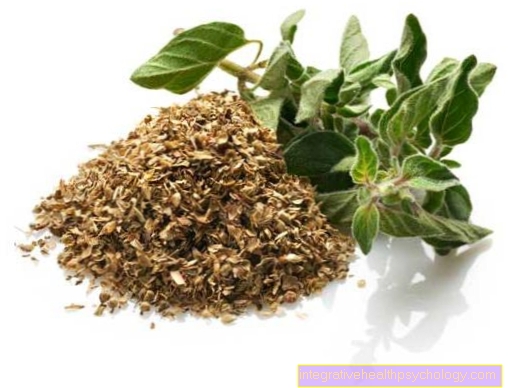








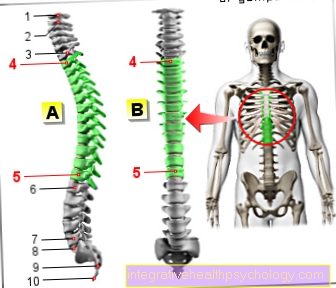

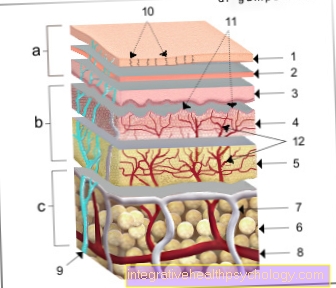

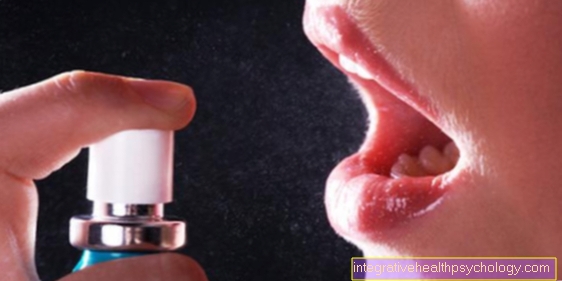



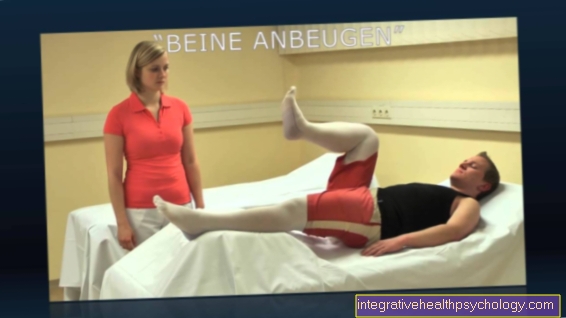


.jpg)
